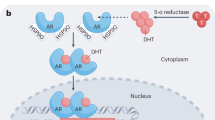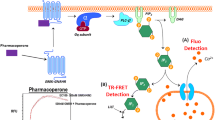Abstract
Tumour-inhibitory effects of a new antagonist of growth hormone-releasing hormone (GH-RH), MZ-4-71, were evaluated in nude mice bearing androgen-independent human prostate cancer cell lines DU-145 and PC-3 and in Copenhagen rats implanted with Dunning R-3327 AT-1 prostatic adenocarcinoma. After 6 weeks of therapy, the tumour volume in nude mice with DU-145 prostate cancers treated with 40 microg day(-1) MZ-4-71 was significantly decreased to 37 +/- 13 mm3 (P < 0.01) compared with controls that measured 194 +/- 35 mm3. A similar inhibition of tumour growth was obtained in nude mice bearing PC-3 cancers, in which the treatment with MZ-4-71 for 4 weeks diminished the tumour volume to 119 +/- 35 mm3 compared with 397 +/- 115 mm3 for control animals. Therapy with MZ-4-71 also significantly decreased weights of PC-3 and DU-145 tumours and increased tumour doubling time. Serum levels of GH and IGF-I were significantly decreased in animals treated with GH-RH antagonist. In PC-3 tumour tissue, the levels of IGF-I and IGF-II were reduced to non-detectable values after therapy with MZ-4-71. The growth of Dunning R-3327 AT-1 tumours in rats was also significantly inhibited after 3 weeks of treatment with 100 microg of MZ-4-71 day(-1) i.p. as shown by a reduction in tumour volume and weight (both P-values < 0.05). Specific high-affinity binding sites for IGF-I were found on the membranes of DU-145, PC-3 and Dunning R-3327 AT-1 tumours. Our results indicate that GH-RH antagonist MZ-4-71 suppresses growth of PC-3, DU-145 and Dunning AT-1 androgen-independent prostate cancers, through diminution of GH release and the resulting decrease in the secretion of hepatic IGF-I, or through mechanisms involving a lowering of tumour IGF-I levels and possibly an inhibition of tumour IGF-I and IGF-II production. GH-RH antagonists could be considered for further development for the therapy of prostate cancer, especially after the relapse.
This is a preview of subscription content, access via your institution
Access options
Subscribe to this journal
Receive 24 print issues and online access
$259.00 per year
only $10.79 per issue
Buy this article
- Purchase on Springer Link
- Instant access to full article PDF
Prices may be subject to local taxes which are calculated during checkout
Similar content being viewed by others

Author information
Authors and Affiliations
Rights and permissions
About this article
Cite this article
Jungwirth, A., Schally, A., Pinski, J. et al. Inhibition of in vivo proliferation of androgen-independent prostate cancers by an antagonist of growth hormone-releasing hormone. Br J Cancer 75, 1585–1592 (1997). https://doi.org/10.1038/bjc.1997.271
Issue Date:
DOI: https://doi.org/10.1038/bjc.1997.271
This article is cited by
-
Antiproliferative effect of growth hormone-releasing hormone (GHRH) antagonist on ovarian cancer cells through the EGFR-Akt pathway
Reproductive Biology and Endocrinology (2010)
-
Luteinising hormone-releasing hormone analogue reverses the cell adhesion profile of EGFR overexpressing DU-145 human prostate carcinoma subline
British Journal of Cancer (2005)
-
Models of metastatic prostate cancer: a transgenic perspective
Prostate Cancer and Prostatic Diseases (2003)
-
Synthetic peptides and their non-peptidyl mimetics in endocrinology: From synthesis to clinical perspectives
Journal of Endocrinological Investigation (1998)


